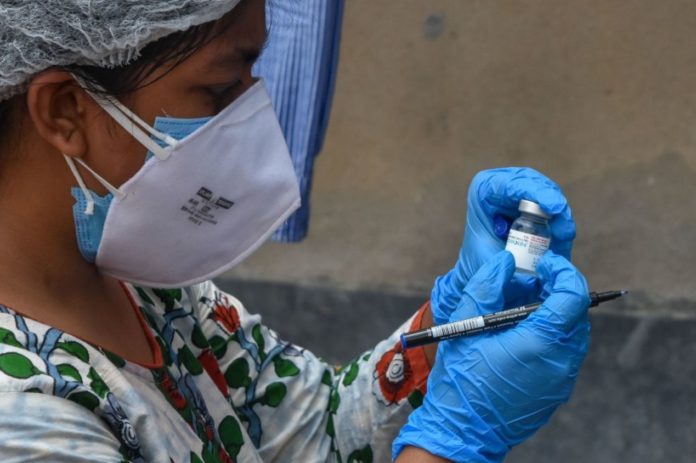How likely are those who are fully vaccinated to get Covid-19 and what should those infected expect? Researchers answer
People infected with the new Sars-CoV-2 coronavirus after vaccination are more likely to have a lower viral load, a shorter duration of infection and much milder symptoms than those not vaccinated.
“If you get vaccinated, about 90 per cent of the time you’re not going to get COVID-19,” points out Dr Jeff Burgess, professor at Mel & Enid Zuckerman College of Public Health and continues “even if you do get it, there will be less of the virus in you and your illness is likely to be much milder”.
- Does This Mean We Stopped Being Animal and Started Being Human Due to ‘Copy Paste’ Errors?
- The One Lifestyle Choice That Could Reduce Your Heart Disease Risk By More Than 22%
- Aging: This Is What Happens Inside Your Body Right After Exercise
- Immune-Boosting Drink that Mimics Fasting to Reduce Fat – Scientists ‘Were Surprised’ By New Findings
- Gun Violence in America: What They Don’t Talk About at the Debate
While COVID-19 vaccines have been shown to be extremely effective in preventing infection, no vaccine is 100% effective and infections can occur, but to a much lesser extent.
The paper, published in the New England Journal of Medicine, incorporates data from two ongoing CDC-funded studies: the AZ HEROES study and the Abt Associates-led Research on the Epidemiology of SARS-CoV-2 in Essential Response Personnel (RECOVER) study.
Study participants – health care personnel, first responders, and other essential and frontline workers in eight U.S. locations – continue to undergo weekly nasal swabs to test for COVID-19, as well as quarterly blood tests.
Among 3,975 participants in two studies, SARS-CoV-2 infections were detected in five fully vaccinated participants and 11 partially vaccinated participants, as well as 156 unvaccinated participants. About half of the participants came from Arizona study areas.
The researchers found that study participants who were fully or partially vaccinated with Pfizer and Moderna mRNA vaccines and became infected had a 40% lower viral load than unvaccinated participants.
The viral load – the amount of SARS-CoV-2 virus found in a test sample – is thought to play a role in the severity of the disease and may affect secondary transmission.
In addition to the severity of the disease, the researchers also examined its duration. The majority of infections among unvaccinated participants lasted two or more weeks, compared with only one week among vaccinated participants.
In addition, the risk of COVID-19 infection with fever was 58% lower for vaccinated participants, who reported an average of two fewer days of illness and a total illness duration of six days less than that of unvaccinated individuals.
- Does This Mean We Stopped Being Animal and Started Being Human Due to ‘Copy Paste’ Errors?
- The One Lifestyle Choice That Could Reduce Your Heart Disease Risk By More Than 22%
- Aging: This Is What Happens Inside Your Body Right After Exercise
- Immune-Boosting Drink that Mimics Fasting to Reduce Fat – Scientists ‘Were Surprised’ By New Findings
- Gun Violence in America: What They Don’t Talk About at the Debate
Also based on data from December 14 to April 10, the rteam found that two doses of one mRNA vaccine were 91% effective against SARS-CoV-2 infection.
In addition, the report showed that a single dose of the vaccine proved 81% effective against SARS-CoV-2 infection.
“We are still seeing the same high levels of vaccine effectiveness, so we feel good about that,” said Dr Burgess.
But more importantly, we’ve added a number of measures of the severity of infection among individuals who have been vaccinated as a comparison to those who haven’t, and we measured how much virus there is and for how long
Photo by Debarchan Chatterjee/NurPhoto via Getty Images
